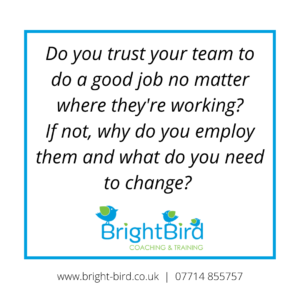management
Don't be an ostrich - Dare to ask!
Don't be an ostrich - Dare to ask!
By Karen Amos
The change continues inexorably onwards, although thankfully not always at this pace. It’s clear however, that the current challenges and uncertainties are going to be with us for a significant time to come.
There are an overwhelming amount of challenges facing managers and business owners as we leave lockdown, whether that's in business, schools, or organisations, including:
- Bringing staff back into the workplace from home working or furlough
- Managing geographically dispersed teams
- Managing redundancy and re-structures
- Managing the health and safety needs of staff and the public
Whilst home-working has introduced increased effectiveness in many areas, there are difficulties too. If you’re used to asking a question from the person sat at the next desk for example, there’s an inevitable time lag if you’re homeworking.
Additionally, whilst there was a huge novelty factor for many at the start of homeworking, there’s now a marked division in those who want to remain working from home and those who are desperate to return to the workplace. Failure to address this will cost many businesses enormously.
Socially distanced working and constant change also means managers have to work extra hard at employee engagement, particularly when there are tough business and strategic decisions that need to be taken.
Of course, with challenges also come opportunities.
- For managers and business owners to review their role and what this means in relation to the team and productivity
- To forge a new, stronger relationship with the team
- To re-generate a more positive culture
- To harness new ideas and ways of working to strengthen the organisation for the future
The challenge of course, is how to maximise those opportunities in the face of what are complex business and organisational landscapes. How do you balance the need for honesty, whilst giving your teams the support they need?
The answer lies in questions. This will be no surprise to many of you that by this, I mean taking a coaching approach.
I know from personal experience that this can be scary. After all, we may not get the answer we would like! I’ve certainly worked with some people in my remote past whom I would have quailed to ask for fear of opening the inevitable humongous can of worms that would follow. With that comes the ostrich approach to management. You know the one – asking the cheery, ‘How is everyone today? All well? Oh, good!’, whilst departing the room at a rate of knots. But at least you asked didn’t you?
Nowadays thankfully, I know better. Asking meaningful questions doesn't mean throwing yourself to the lions, then being left in a position where you can’t possibly deliver on the answer. Instead this involves employee engagement in its truest sense, where everyone is supported to take appropriate responsibility for seeking solutions.
 Often our first response is to jump in and ‘do the right thing’ like some managerial Tigger, who is inevitably left wondering, ‘What happened there?’ Instead, we’re talking about a more consultative approach. Coaching isn’t about giving everyone what they ask for – the needs of the business must come first, after all, that’s why you’re all there.
Often our first response is to jump in and ‘do the right thing’ like some managerial Tigger, who is inevitably left wondering, ‘What happened there?’ Instead, we’re talking about a more consultative approach. Coaching isn’t about giving everyone what they ask for – the needs of the business must come first, after all, that’s why you’re all there.
Ask yourself and your team the following coaching questions to help understand what’s really needed:
- What is and isn’t working for you right now?
- How would you prefer things to be in an ideal world?
- What do you need to be productive and well at work?
- What are your main challenges right now?
- What do you foresee your challenges to be in the short/medium and long term?
Then follow up with:
- What would help right now?
- What can you change in your practice or way you’re approaching things that would help?
- What practical measures can you, the team, or the organisation put in place?
- What support do you need, from whom and how often?
- How can you provide support to others?
- How will you recognise that things are not working in future?
The obvious approach is for managers to schedule dedicated one-to-one time with employees on a regular basis. The solution for one employee, may not be right for another, but again this is something you can agree on individually.
Another way to embed a solution-focused attitude within the team is through implementing Team Coaching. This is an extremely effective tool in times of change and uncertainty. The team can work out the above issues, supporting each other and taking responsibility for finding and implementing the solutions. It’s also a powerful way to build accountability.
Either way, taking a coaching approach does involve an amount of courage for any business owner or manager, but the positive benefits for the team and business or organisation will be considerable and will far outweigh the costs and anxiety of being an ostrich.
If you'd like to find out more about Team Coaching, get in touch.
For an informal, no-obligation chat about how we can help you, call us on 07714 855757, or email [email protected].
 Karen Amos is an executive coach and founder of BrightBird Coaching & Training. She supports business owners and managers who are feeling the pressure, to get the best out of themselves and their teams. She brings a practical, down-to-earth approach to improving working lives through better leadership, communication and working relationships.
Karen Amos is an executive coach and founder of BrightBird Coaching & Training. She supports business owners and managers who are feeling the pressure, to get the best out of themselves and their teams. She brings a practical, down-to-earth approach to improving working lives through better leadership, communication and working relationships.
Let's be honest about it... Do you have the courage to say you don't know?
Let's be honest about it... Do you have the courage to say you don't know?
by Karen Amos
There has, rightly I'd say, been criticism of the government and the like, regarding a lack of information. This leads to statements like, 'treating us like children' and people translating the law according to their own preferences.
The problem is, there's probably a lack of credible information to give right now, be this be at a government level, or within a school or businesses. We're living in a high state of uncertainty, which brings anxiety. This naturally leads people to think there's something negative or sinister going on and off we all go...
Nature abhors a vacuum and in my experience, this applies to information too. Create a space and someone will fill it. It doesn't matter if what's filling the space is true, credible, or even helpful - it will get filled. Just check out the tabloids if you've any doubt!
This is an area where Authentic Leadership provides the way forward. Behaviours of Authentic Leaders include honesty and openness. What Bill George calls Relational Transparency – Sharing of thoughts and beliefs with honesty and genuineness – no games or hidden agendas.
This means if you don't know the answer to something, you say so.
Another of the behaviours is the ability to solicit or consider other viewpoints - enlisting the help and resources of those around you to help you find the right path or solution. It's hard to admit we don't know, particularly when we're working in a position of authority, but done well, this will build trust and strengthen teams, not take it away.
If you would like to find out how BrightBird can help you build leadership performance and support your teams to remain positive and productive, get in touch for a no-obligation chat. We offer online 1-to-1 coaching support from senior leadership to front-line staff, group and peer coaching and training/webinars.
Tel: 07714 855757 or email: [email protected]
Check out our latest training offers at: https://brightbird.wordifysites.com/services/training-courses/
 Karen Amos is an executive coach and founder of BrightBird Coaching & Training. She supports business owners and managers to get the best out of themselves and their teams. She brings a practical, down-to-earth approach to improving working lives through better leadership, communication and working relationships.
Karen Amos is an executive coach and founder of BrightBird Coaching & Training. She supports business owners and managers to get the best out of themselves and their teams. She brings a practical, down-to-earth approach to improving working lives through better leadership, communication and working relationships.
Do you trust your team...? If not, why not?
Do you trust your team...? If not, why not?
By Karen Amos
I reflected in a previous post how the current Covid-19 situation seems to have brought out the best and worst in people and never more so than in the behaviour of leaders, managers and businesses/organisations. We’ve had the whole spectrum, from unkind, exploitative and selfish behaviour at one extreme, to altruistic, brave and compassionate behaviour at the other.
In the last few weeks, I’ve seen plenty of examples of both, often in the same sectors. For example, schools who send tons of homework out, expecting staff to provide evidence of planning and marking and sending ‘strongly worded’ communications to staff, parents and pupils alike when deadlines aren’t met. On the other hand, there are the school leaders who have prioritised the welfare of the children and their families over ‘outputs’, leading from the front and doing whatever it takes to ensure people in their communities are OK during this time.
There are also the organisations and businesses who insist on checking up on their staff, expecting detailed daily and weekly reporting, just because people are working from home. Those who expect detailed timesheets to account for people’s working time. Alternatively, there are the leaders who have the conversation with their teams that say, ‘How are things for you right now? What do you need from us to make this work for you?’ – and actually listen to and act on the answers.
In essence, this comes down to a matter of trust. I often ask a question of business owners and managers – ‘Why do you continue to employ someone that you don’t trust to do a good job?’ My view is that we should do one of two things:
1. Create the environment your employees need to thrive and do what they do well.
2. Or if there’s a performance/attitude issue, get some advice and go down the capability/disciplinary route – and/or seriously think about evaluating how robust your recruitment systems are.
If you feel you can't trust your teams, then it's time for you as a leader to take action. Ask yourself, 'What's going on here?', 'What's the root cause of this problem?' and be prepared to take action - remembering that you may actually be the problem. Time to work out how you can be the boss you'd like to have.
If you would like to find out how BrightBird can help you build leadership performance and support your teams to remain positive and productive, get in touch for a no-obligation chat. We offer online 1-to-1 coaching support from senior leadership to front-line staff, group and peer coaching and training/webinars.
Tel: 07714 855757 or email: [email protected]
 Karen Amos is an executive coach and founder of BrightBird Coaching & Training. She supports business owners and managers to get the best out of themselves and their teams. She brings a down-to-earth approach to improving working lives through better leadership, communication and working relationships.
Karen Amos is an executive coach and founder of BrightBird Coaching & Training. She supports business owners and managers to get the best out of themselves and their teams. She brings a down-to-earth approach to improving working lives through better leadership, communication and working relationships.
Herding Cats – Or the Art of Building Responsibility and Accountability
Herding Cats – Or the Art of Building Responsibility and Accountability
By Karen Amos
There’s been a theme for many of my clients recently – that of how to build effective responsibility and accountability in their teams and organisations.
It’s easy to point the finger of blame when things go wrong, but we need to be clear on our own levels of responsibility and accountability before we expect others to do the same. It’s interesting how many managers complain about feckless or inconsiderate behaviour within teams, yet have never clearly defined their own, or their team’s expectations regarding the alternative. Or often, and possibly worse, have subconsciously imposed different standards of behaviour for themselves versus that of others. Quick check: If you find yourself saying, ‘Yes, but….’ when questioned about this, you can be sure you’re part of the problem!
Building a coaching culture within organisations is a highly effective way to increase personal and collective responsibility and increase ownership and clarity around accountability. It’s often (incorrectly) seen as a ‘soft’ approach to leadership and management, to be side-lined if performance management or the ‘hard word’ is needed.
I believe this completely misses the point of what coaching is.
A coaching approach, used properly, will be the most challenging, yet effective solution to team performance for managers and staff alike. It works equally well through both informal and formal management interventions – indeed it should run through all your communications with people like the proverbial stick of rock.
 The reason for this effectiveness is the emphasis on doing ‘with’ not ‘to’ your staff. Whilst it’s easy to lecture and give the ‘hard word’, this all too frequently leads to the other person feeling victimised and powerless, which quickly leads to teams taking no responsibility for solving the issue. Let's face it, it's much easier to say your boss is a right so-and-so, rather than face up to the fact you didn't do your job right! Coaching on the other hand, requires all parties to contribute to solving the issue. This puts ownership right where it belongs.
The reason for this effectiveness is the emphasis on doing ‘with’ not ‘to’ your staff. Whilst it’s easy to lecture and give the ‘hard word’, this all too frequently leads to the other person feeling victimised and powerless, which quickly leads to teams taking no responsibility for solving the issue. Let's face it, it's much easier to say your boss is a right so-and-so, rather than face up to the fact you didn't do your job right! Coaching on the other hand, requires all parties to contribute to solving the issue. This puts ownership right where it belongs.
An example of this was seen through an executive coaching client of mine (names and details removed to preserve confidentiality). He was despairing of a long-standing member of his team who wasn’t performing, missing targets and despite several ‘discussions’ was on the verge of formal performance management procedures. Upon examination, my client when asked, couldn’t tell me the reason for the person’s performance issue, so this became the first step in his new approach, which included using coaching skills to elicit from the member of staff what they thought the solution could be.
It’s important to remember that coaching doesn’t ignore standards, organisational strategies, goals and targets. Rather it works within these to come up with alternative solutions to enable people to perform at their best.
The outcome of the situation with my client was that he did commence formal capability proceedings, but was actually thanked for his support by the member of staff, who had a clear action plan they felt they could own and implement. Importantly, they were now taking full responsibility for their own actions, but were empowered by feeling they were in control of this.
Here are a few coaching questions to help you and your team explore and build responsibility and accountability:
- What’s my responsibility here and what am I accountable for and to whom?
- Does my team/manager know and agree with this?
- Are my team clear about who is responsible and accountable for each piece of work they do?
- Are people as involved as they can be regarding agreeing responsibilities? Do we instruct, or consult regarding this?
- Do we have agreed check in points to review how this is going?
If you would like to find out more about how BrightBird Coaching and training can help you and your team to develop more accountability and responsibility, please contact us for a no-obligation chat. We offer short workshops, to multi-day training and 1:1 and team coaching.
Check out our latest Effective People Management Programme HERE.
Tel: 07714 855757 or email: [email protected]
 Karen Amos is an executive coach and founder of BrightBird Coaching & Training. She supports business owners and managers to get the best out of themselves and their teams. She brings a down-to-earth approach to improving working lives through better leadership, communication and working relationships.
Karen Amos is an executive coach and founder of BrightBird Coaching & Training. She supports business owners and managers to get the best out of themselves and their teams. She brings a down-to-earth approach to improving working lives through better leadership, communication and working relationships.
Never knowingly letting facts stand in the way of a good assumption….
Never knowingly letting facts stand in the way of a good assumption….
By Karen Amos
I’ve had a couple of similar experiences this week with clients and associates. They’ve reported situations where they, or people working for or with them, were becoming upset and anxious about certain issues.
There was one core theme – everyone was guessing how everyone else felt and what they thought about the situation. It’s amazing – and as a coach, I come across this all the time – people behave like they have some sort of innate psychic ability. Except that if they did (spoiler alert: they don’t!), they really shouldn’t go splashing out on too many lottery tickets as they don’t seem to be very good at it!
One of the huge benefits to having a coach is that you have access to someone skilled in ‘reality checking’. As is often the case, this sounds simple, but it’s really not. Think about it. Any misunderstanding around a situation is usually because the parties involved aren’t on the same wavelength – they don’t share the same reality as the other person. There are innumerable reasons for this, but they include:
- Not recognising our own feelings
- Not recognising the other person’s feelings
- Not having access to all the information
- Working to different timescales
…and the list goes on.
Obviously, this lack of information leaves gaps – and we don’t like gaps, as they make us feel insecure – so we try to fill them. The way we do this is usually through making assumptions. Of course it’s Janet’s fault that you feel nervous about attending the meeting she’s chairing, because she clearly doesn’t care about your feelings…
 A coach is able to bring a fresh perspective through the use of questions, that help clarify, not what’s going on, but what’s REALLY going on. Sometimes this can be tough, as let’s face it, it’s much easier to blame Janet for chairing rotten meetings that make you nervous, rather than admit the reality that you never seem to have the time to properly prepare for them. Knowing what’s REALLY going on, means you can then start to find a solution to the issue. Maybe you need to stop assuming Janet knows how you feel and ask for some support. Maybe you need to re-prioritise your workload to allow time to prep for meetings so you’ve opportunity to shine and show off your achievements…
A coach is able to bring a fresh perspective through the use of questions, that help clarify, not what’s going on, but what’s REALLY going on. Sometimes this can be tough, as let’s face it, it’s much easier to blame Janet for chairing rotten meetings that make you nervous, rather than admit the reality that you never seem to have the time to properly prepare for them. Knowing what’s REALLY going on, means you can then start to find a solution to the issue. Maybe you need to stop assuming Janet knows how you feel and ask for some support. Maybe you need to re-prioritise your workload to allow time to prep for meetings so you’ve opportunity to shine and show off your achievements…
Here are a few useful coaching questions when you find yourself in a difficult situation:
- What’s going on here?
- What’s REALLY going on here?
- What’s the root cause of my problem – is it something I can control?
- Does the other person know I’m experiencing this problem?
- What do they think about this?
- What’s the reason for their behaviour?
And most important of all…
- What’s my evidence to prove this?
Once you’ve started to make sense of your reality, you can then take positive steps to improve your communication without the hang-ups that often hold us back - and perhaps even pack away that crystal ball...
If you’d like to find out more about how coaching can help you, contact Karen Amos at BrightBird Coaching and Training to book your free discovery session. Karen will help you to explore the issues and challenges you’re facing and how you can overcome these.
Karen Amos is an executive coach and founder of BrightBird Coaching & Training. She supports business owners and managers to get the best out of themselves and their teams. She brings a down-to-earth approach to improving working lives through better leadership, communication and working relationships.
Contact: [email protected] / 07714 855757
Dare you discuss your work performance?
By Karen Amos
I've just listened to an excellent episode of 'Ramblings' on Radio 4, where Clare Balding discussed mental health in business with an ex-CFO of a FTSE 250 company. He explained how he had experienced depression all his life, but felt he had to hide this in his workplace, as to disclose this would have been detrimental to his career.
He also discussed his lifelong tendency to focus on the negative - something I'm sure most of us have suffered from at some point. A classic example of this is ignoring the 99% positive feedback in your performance review and just hearing the 1% that could have been better.
Whilst there is a difference in the interventions needed to help people who are experiencing mental ill-health, there was a clear acknowledgement that there was a need to discuss areas of concern, performance and difficulties faced in the workplace. This is necessary to proactively prevent mental illness and promote wellbeing and build positive performance.
The assumption is that men find it more difficult to talk about themselves. My experience as an executive and professional development coach however, is that just as many women face the same fears and challenges. Surely, being able to do this should be seen as a strength, but many of my clients will not disclose to others that they are receiving coaching for fear of being perceived as 'weak' or 'under-performing'.
At the end of the programme Clare Balding asked the man if he would have any problem engaging with a sports coach to enhance his performance on the field. Without hesitation he said, 'No'. The implication is that this is seen as a positive move. The question then was, 'Why then are so many people reluctant to seek the same help in the workplace?' That support exists - it's also called a coach!
What's your stance on engaging someone to help your peformance at work? Are you prepared to speak candidly with someone, in confidence about your work performance, or does this feel 'unsafe' for you?
Karen Amos is an executive and professional development coach and training and the owner of BrightBird Coaching & Training. If you'd like to find out more about how Karen can help you and your team to be more positive and productive, get in touch for a no-obligation chat. Call on 07714 855757, or email [email protected]
Stop the Bus! How to Deal with Overwhelm...
Stop the Bus! How to deal with overwhelm…
By Karen Amos
I was working with someone this week who confided in me that she was feeling completely overwhelmed with work. My response? ‘Stop the bus!’ Well, this gained her attention if only to wonder what on earth I was talking about (particularly seeing as there was no bus in sight) - which was compounded by my next instruction, ‘Turn off the ignition. Now get off the bus!’
Feelings of overwhelm are no stranger to most of us – I include myself in this. Issues and tasks mount up and we become less and less effective, whilst proportionately becoming more and more anxious. It frequently leads us to a complete standstill, or at best, with us tinkering around the edges with minor activities, whilst the important stuff is left unattended.
To be honest, I’ve found myself in just that situation this week, so thought I’d share a few thoughts and strategies on how I’ve dealt with this.
- Stop the bus!
In order to deal with overwhelm, we need to stop the endless cycle of panic, fear and urgency that’s gripping us. We need to recognise these are just feelings – our feelings. They don’t accurately reflect what’s going on in the world around us.
One way to do this is to ‘Stop the ‘overwhelm’ bus’ by literally doing just that – stopping and taking time out to evaluate your situation. ‘Are you joking?’ I hear you exclaim! ‘That’s the point, I can’t take time out and that’s why I’m feeling overwhelmed!’
As I alluded to earlier, we need to check out the reality of this situation. Chances are if we’re feeling overwhelmed, we’re being completely, or at least relatively, inefficient. We aren’t working at our best, or most effective, so looking at it that way, wouldn’t it be a good investment to take at least a couple of hours out to fix the situation, knowing you’ll be back to full capacity when you’ve done so?
However you visualise it, stop your bus, turn it off and get off. Plot out a couple of hours for yourself where you won’t be disturbed, take a change of scenery if that helps, but lift yourself out of that head-down, flat-panic world.
- Work out what’s important
It’s so easy when feeling overwhelmed, to get caught up in tasks and minor activities. This just leads to a vicious cycle of firefighting, where you haven’t a second to look up and take control. As a result, your first task needs to be to identify what are the important, significant issues and goals you should be dealing with.
I’ve just re-visited my 12-week-year planner, to re-focus and remember what I’m actually working towards. Seeing things in a ‘broader-brush’ context is often immediately comforting. If you don’t already have a plan or strategy, just ask yourself, ‘What would I like to see that would make the most difference in 6/12 months’ time?’ and start from there.
- Prioritise
This is a word that’s thrown around like confetti, but let’s face it, if it was that easy we’d already be doing it, right? The problem with overwhelm is that often everything feels like a priority. You feel leaned on and obligated to other people too.
I’ve found there are some great coaching questions to help weed out what’s really a priority. Try a few of these:
- Does this help me achieve my bigger plan/strategy/aims?
- Do I actually need to do this? What will happen if I don’t? (If you’re not sure, try a very informal risk assessment in your head – i.e. What’s the probability and severity or not doing this).
- Is this my priority/issue, or is this really someone else’s?
- If it’s someone else’s, how do I hand this back to them, or help them with this?
- What one thing could I do right now that would make the most difference?
- When do these things actually need doing by? Set some new timescales according to your capacity.
- Is there someone else who can help with this?
- Facing your demons
Just one final thought – I often work with clients who feel overloaded with minor activities and tasks at all levels in organisations. There’s a common theme when we start to drill down though, which is that we often focus on small tasks and activities, as they’re easier and less daunting than tackling the bigger issues.
Again, useful coaching questions would be:
- Being honest myself, is there anything I’m avoiding right now?
- What would I advise someone to do in my position?
Hopefully, you’ve found something useful in there, for you, or a member of your team and can stop your runaway bus or train and embark on a more enjoyable and productive journey.
If you would like to book one-to-one or Team Coaching for your business, organisation or school, or would like an informal, no-obligation chat about how this can work for you, call us on 07714 855757, or email [email protected].
You can book a FREE Discovery Coaching session to experience the benefits of coaching yourself. Find out more HERE.
You can find out more and book using the links below:
Check out our latest training FREE Introduction to Coaching and Essential Coaching Skills Webinars at: https://brightbird.wordifysites.com/book-a-course/
 Karen Amos is an executive coach and founder of BrightBird Coaching & Training. She supports business owners and managers to get the best out of themselves and their teams. She brings a practical, down-to-earth approach to improving working lives through better leadership, communication and working relationships.
Karen Amos is an executive coach and founder of BrightBird Coaching & Training. She supports business owners and managers to get the best out of themselves and their teams. She brings a practical, down-to-earth approach to improving working lives through better leadership, communication and working relationships.
Helping you move the rug when you’re stood on it – The power of coaching
By Karen Amos
My late and much-missed mentor used to have a brilliant phrase when I was bogged down in work issues – ‘You’re trying to move the rug, but you’re stood on it.’ It's a phrase I now use with many of my clients and the response is usually a resounding, ‘Yes! It’s exactly that!’
Often as a coach, this is exactly what I’m tasked to do – help my clients move that rug. So what’s the rug? It could be anything from managing an overwhelming workload, unpicking the intricacies of team dynamics to enable staff to work effectively, to prioritising which problem or issue to deal with first to develop a robust business. Whatever the scenario, I'm sure you know that feeling of pressure, but not knowing even where to start to resolve things, as every factor seems to depend on other factors for success.
Why can't we just sort this stuff out for ourselves? Basically, it’s due to the plate spinning that’s part of everyday working life. Here’s an example. Clients often come to me to improve their time management and work-life balance. If it was that simple, they wouldn’t need a coach. After all there are any number of books, apps and online videos with a plethora of tips and strategies.
So why is coaching successful when these things often fail?:
1. You need to identify the right issue to work on. If you don’t get to the root cause of the problem, you’ll continue to come back to the same issues. Whilst hints and tips are useful, they only address the symptoms of the problem. To gain lasting change, you need to find out what the real issue is. Using time management as an example, people often come to me to help manage their emails or to-do list, but the root cause could actually be a lack of confidence to say no, or other members of the team not doing their share.
2. Gives you a strategy for success – Once you’ve identified the root cause of the problem, coaching helps you put in place a strategy for the future as you’d choose it to be. Coaching helps you lift your head and gain a clearer picture of what a good solution to your problem would be. Again, an example would be that we would work on confidence, mindset and communication skills to enable you to be able to say no to unreasonable demands and put alternative actions into place.
3. Coach as accountability buddy – It’s easy to give in when the going gets tough isn’t it? We’ve all experienced this at some time or another, whether it’s learning a new language or embarking on a fitness drive. Knowing you’ve a regular meeting with someone who is going to ask about your progress is often a powerful motivator to stick with change, even when you feel like walking away from it all.
4. Independent feedback – Coaches often talk about ‘challenging’ their clients. This really isn’t as confrontational as it sounds, but we are able to question and dig deeper regarding your motives for your actions and also help you to test out scenarios in a safe space. Your coach is there for you only, so I will often ask my clients if it’s ok to give them some feedback on perhaps how they have presented themselves, or their communication skills. Completely independent feedback is often impossible to come by in our work and personal relationships and can be invaluable to help move you to more positive ways of behaving.
5. Walking toolkit – I often describe myself as a walking toolkit for my clients. Through my experience, training and development as a coach, I’ve picked up lots of concepts and tools that can help frame the world differently and bring some clarity and a way forward. This could be everything from decision-making tools, to understanding your personal interactions with others, to leadership approaches. As mentioned above, these aren’t used indiscriminately, but rather are tailored to your individual requirements, saving you having to filter out what you need from the overload of information out there.
Hopefully that’s given you a taste of why coaching can be such a powerful tool - supporting you make positive changes when you really can’t see a way out of the situation. Helping you to move that rug!
Karen Amos is an Executive and Professional Development Coach and owner of BrightBird Coaching & Training. She specialises in supporting managers and business owners to build positive and productive teams, through 1:1 and team coaching and training workshops.
If you would like to find out how BrightBird can help you build your performance and support your teams to remain positive and productive, get in touch for a chat and to book your no-obligation FREE 1-hour Discovery coaching session.
We offer online video 1-to-1 coaching support from senior leadership to front-line staff and also team/group coaching.
Tel: 07714 855757 or email: [email protected]
 Karen Amos is an executive coach and founder of BrightBird Coaching & Training. She supports business owners and managers to get the best out of themselves and their teams. She brings a down-to-earth approach to improving working lives through better leadership, communication and working relationships.
Karen Amos is an executive coach and founder of BrightBird Coaching & Training. She supports business owners and managers to get the best out of themselves and their teams. She brings a down-to-earth approach to improving working lives through better leadership, communication and working relationships.









